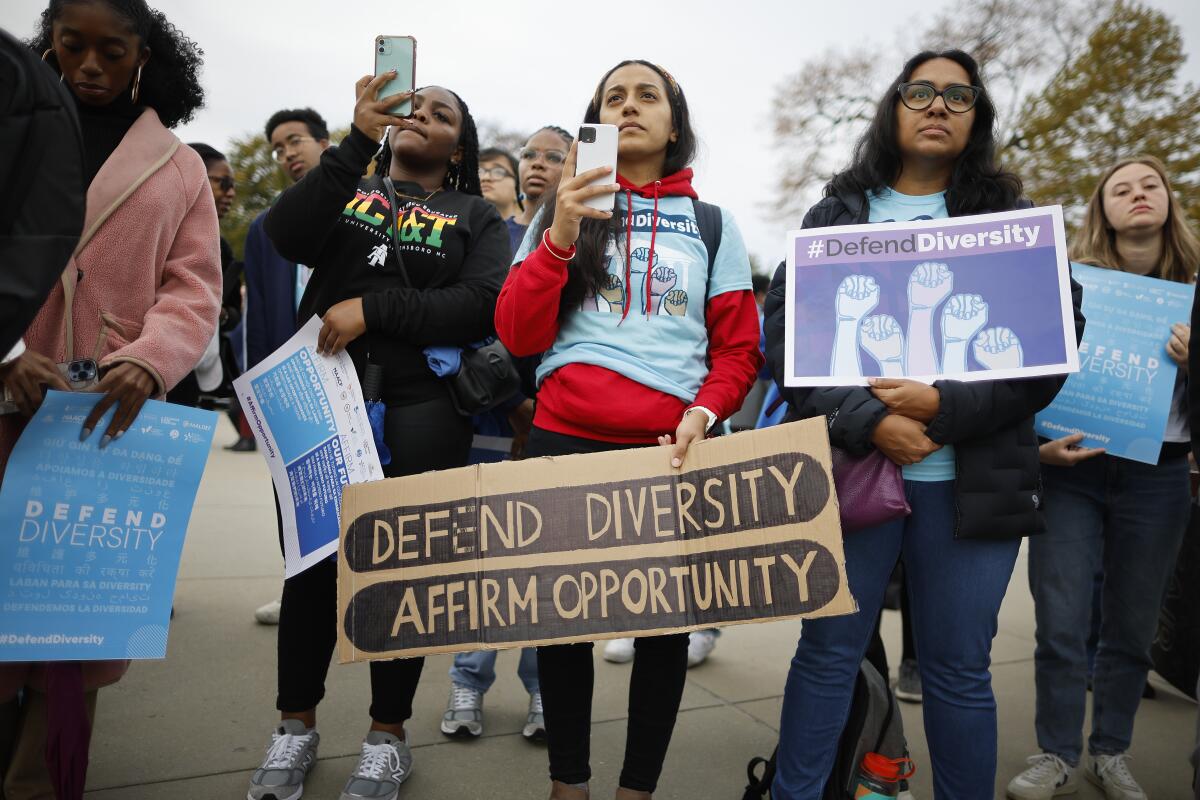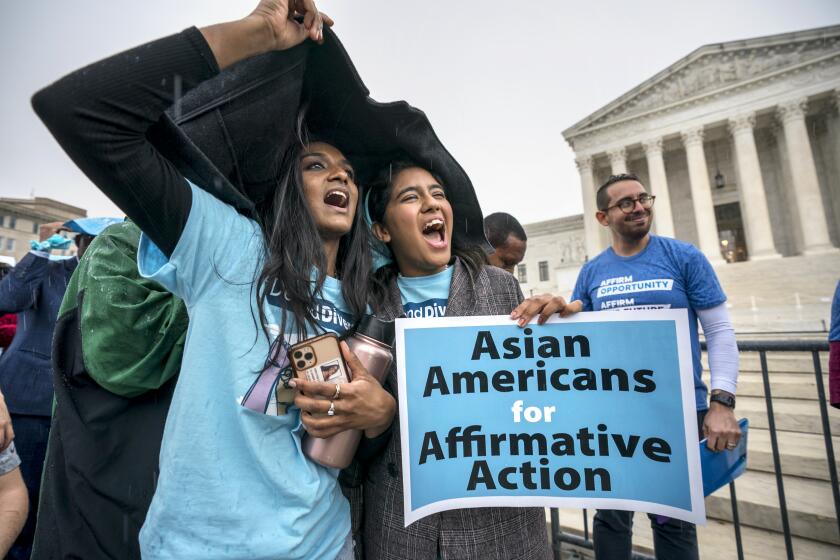Opinion: Now that affirmative action is banned, the way to level the field is one Black student at a time

- Share via
When the Supreme Court banned affirmative action in June, it triggered a new “colorblind” college admissions paradigm that will add to the burden of students who are already loaded down with challenges.
In California, we’ve witnessed the consequences of a colorblind approach since the passage of Proposition 209, in 1996. The lessons here are instructive. The ballot measure claimed to end “preferential treatment” in state schools. It resulted in a 25% reduction in Black student enrollment at state colleges and universities — the largest decline among all groups. Two decades later, UC’s Black enrollment is about 5%; it was slightly more than 7% pre-Prop. 209.
As the executive director of Black College Success — a community-based nonprofit that provides academic pathways to colleges and universities for hundreds of Black students in South Los Angeles — I’m forced to reckon with the difficulty of improving such statistics. You should know that 75% of Black students from the Los Angeles Unified School District don’t enroll in and 85% don’t graduate from a four-year college or university. They come from communities where the median family income is less than $48,000 a year, and where less than 10% of community members have a college degree.
If they truly want a diverse student body, colleges and universities must eliminate all other preferential admissions policies, especially for legacy applicants.
Despite these terrible odds, in May, the Black College Success team celebrated the admission of 208 students to more than 40 colleges and universities, including prestigious institutions such as Stanford, Pepperdine, Pitzer, Tulane and New York University.
It was far from easy for these students. For instance, Jackson, 18 and headed to a competitive school in the northeast, grew up in a single-parent household with a hardworking father who drives for Amazon, faced the challenges of being a Black man in L.A., avoiding gang life and supporting his siblings.
Ajaa, 17, will be a freshman at an HBCU — a historically Black college or university — in Georgia. She won more than $100,000 in scholarships while working part time to support her family, including take care of her younger brother so that her mother could attend school too.
We’re not only trying to shatter the boundaries Black students from South Los Angeles face in gaining access to college, but to also help make clear the transformative opportunity that college offers their families financially for the future.
The college essay, a crucial pitch in which applicants have limited words to describe who they are and why campuses should admit them, just got more stressful for students of color with the affirmative action ban.
Most of the students we work with will be the first in their families to go to college. And our help doesn’t stop there. To get them to graduation (our first cohort hasn’t yet reached that milestone), we follow them wherever they enroll, with continued counseling about class choices and majors and career possibilities.
So, how do we do it? And how will we do it in a post-affirmative action world?
There’s just one way: one student at a time.
First comes the work of finding and recruiting high schoolers for the program.
Beginning as early as sophomore year (as we continue to expand, we’ll eventually work with students starting the moment they enter high school), a team of “college access managers,” who are from the same neighborhoods as our students and have backgrounds in college recruitment, go into our partner high schools, which have expressed an interest in working with us.
The managers figuratively and literally meet the students where they are and offer them an array of supports, starting with academic planning assistance for their A-G requirements, the classes students must complete with a grade of C or better to be eligible to enter the Cal State or UC systems. No matter where students apply, the A-G standards are an objective demonstration that they’re college ready.
An unintended consequence of affirmative action — a policy meant to boost diversity — is that it can be wielded like a weapon to make people of color feel like they don’t belong. The Times spoke with Black and Latino Americans who wonder if this stigma will persist.
At times, the students’ need for mentoring is far greater than our capacity, so we partner with in-school resources, such as the newly created Black Student Achievement Program, and lock arms with other nonprofits like Brotherhood Crusade, 826LA, Los Angeles Urban League and others that can help us provide writing workshops, access to advanced courses and a range of extracurricular activities, stipends for summer internships, career guidance and scholarships.
Once our students become seniors, they receive one-on-one college application assistance, personal statement workshops and financial aid advice. We take them on college and university visits and help them evaluate their choices. Our aim is to provide them with everything they need to level the landscape against peers who often enjoy significant advantages, such as private tutors and schools with more funding and resources than those in South L.A.
In doing this work, I’ve learned that it’s not how high a student’s GPA is or how impressive their test scores are that gets results. It’s an all-of-the-above mix of academics, guidance and the students’ own determination — the ability of a Jackson or an Ajaa to persevere.
I’ve seen stories like theirs by the dozens. My fear is that, in the unfortunate new world of colorblind admissions, the opportunities available to them will diminish. If colleges and universities look past the distinctive experiences of Black applicants, it’s not just the students who will lose, but society.
Ibert Schultz is the executive director of Black College Success, a project of the LA Promise Fund.
More to Read
A cure for the common opinion
Get thought-provoking perspectives with our weekly newsletter.
You may occasionally receive promotional content from the Los Angeles Times.













